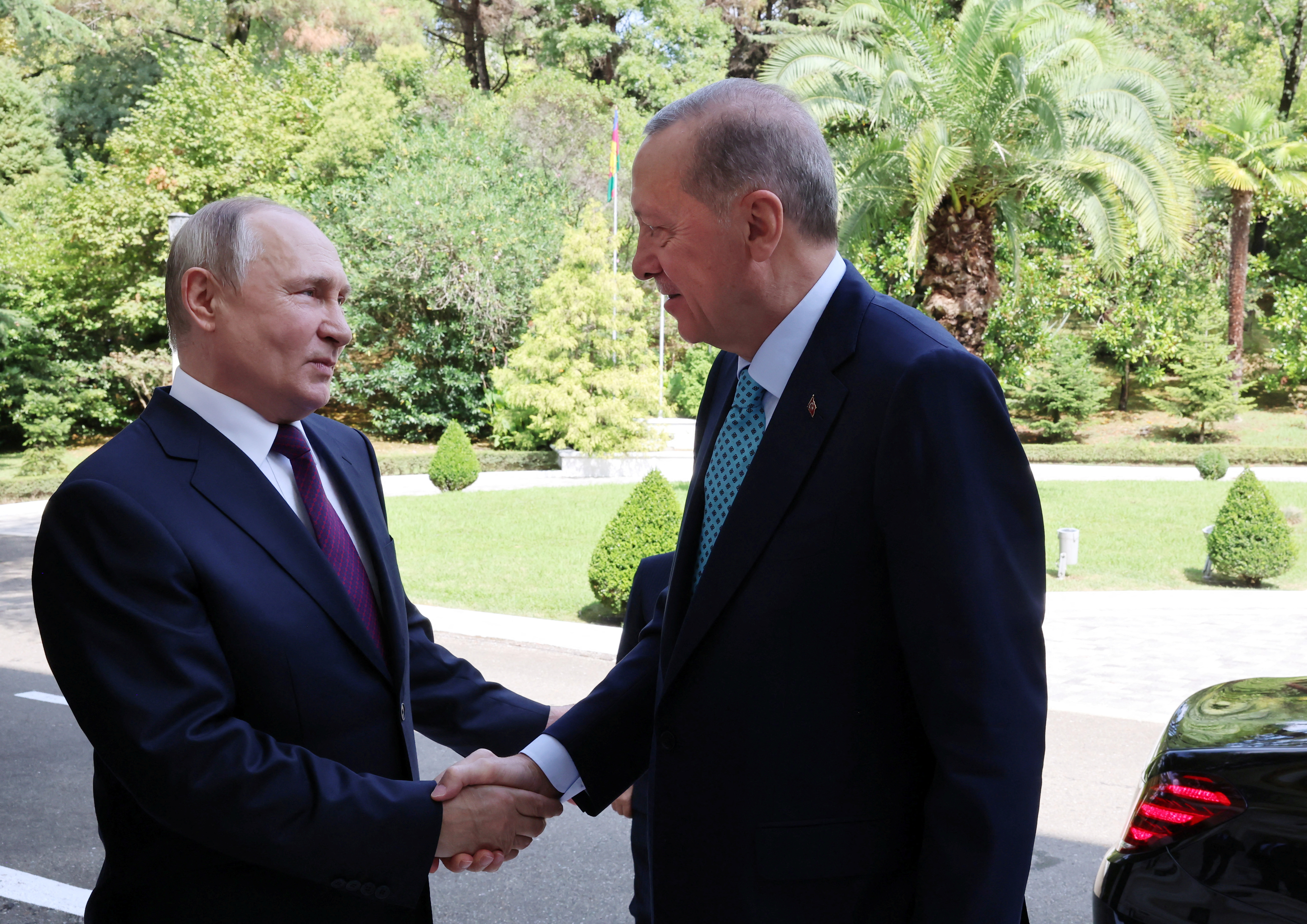
Russian President Vladimir Putin meets with Turkish President Tayyip Erdogan in Sochi, Russia on September 4, 2023. Manual by Murat Sedinmuhurdar/BPO/ REUTERS Get license rights
MOSCOW, Sept 4 (Reuters) – President Vladimir Putin told Turkey’s Tayyip Erdogan on Monday that Russia was open to discussions on a Black Sea grain deal that would help bring Ukraine’s grain to market and ease the global food crisis.
Russia left the deal in July – a year after it was brokered by the United Nations and Turkey – after facing sanctions on its own food and fertilizer exports and complaining that not enough Ukrainian grain was going to countries that needed it.
Erdogan and the United Nations, which previously played a significant role in keeping Putin from sticking to the deal, are trying to get Putin to return to the deal.
Speaking at the start of their meeting in the Black Sea resort of Sochi, Putin told Erdogan he hoped to conclude talks on a natural gas hub in Turkey and would also discuss a grain deal.
“I know you want to raise the issue of the grain deal,” Putin told Erdogan. “We are open to negotiations on this question.”
Erdogan said the world is waiting for news on the grain route issue.
“Everyone is waiting to see what will happen in today’s meeting. “I believe that the message that will come out in the press conference after the meeting will be an important step for the whole world, especially for African countries.”
It aims to get grain from Ukraine via the Black Sea to world markets and ease a global food crisis that the United Nations said was worsened by Russia’s full-scale invasion of Ukraine in February last year.
Russia and Ukraine are the world’s major agricultural producers and play an important role in the wheat, barley, corn, rapeseed, rapeseed oil, sunflower seed and sunflower oil markets.
Ahead of the Erdogan talks, Ukrainian officials said Russia launched an overnight airstrike on one of Ukraine’s main grain export ports.
Romania has denied Ukrainian claims that Russian drones crashed and exploded on the territory of a NATO member.
An application
Putin has said Russia could return to the grain deal if the West implements a separate memorandum it agreed with the United Nations to facilitate Russian food and fertilizer exports.
While Russian food and fertilizer exports are not subject to Western sanctions imposed after Russia’s invasion of Ukraine, Moscow has said restrictions on payments, logistics and insurance hamper exports.
UN Secretary-General Antonio Guterres said on Thursday he had sent Russian Foreign Minister Sergey Lavrov a “set of concrete proposals” aimed at renewing the deal.
One of Moscow’s main demands is for the Russian Agricultural Bank to be re-connected to the SWIFT international payment system. The European Union cut it off in June 2022 as part of tougher sanctions imposed in response to the invasion.
Russian Foreign Ministry spokeswoman Maria Zakharova said on Saturday that things specified by the agreement were not implemented at the last minute. In its report on the meeting, Erdogan said Russian state television must fulfill his promises to Russia.
Russia has blockaded Ukrainian Black Sea ports since invading its neighbor and threatened to treat all shipping as potential military targets after pulling out of a UN-backed deal that allowed Ukraine to export ten million metric tons of produce.
In response, Ukraine announced a “humanitarian corridor” hugging the western Black Sea coast near Romania and Bulgaria. A third ship, the Liberia-flagged Anna-Teresa, left the Black Sea corridor via Istanbul on Sunday.
Russia is debating Putin’s bid to supply Turkey with up to 1 million tons of Russian grain at low prices for subsequent processing at Turkish mills and for shipment to countries that need it most.
By Guy Falconbridge; Additional reporting by Lidia Kelly in Melbourne, Orhan Coskun and Ece Toksabay in Ankara, and Michelle Nichols in the United Nations; Editing by Robert Birzel and Philippa Fletcher
Our Standards: Thomson Reuters Trust Principles.